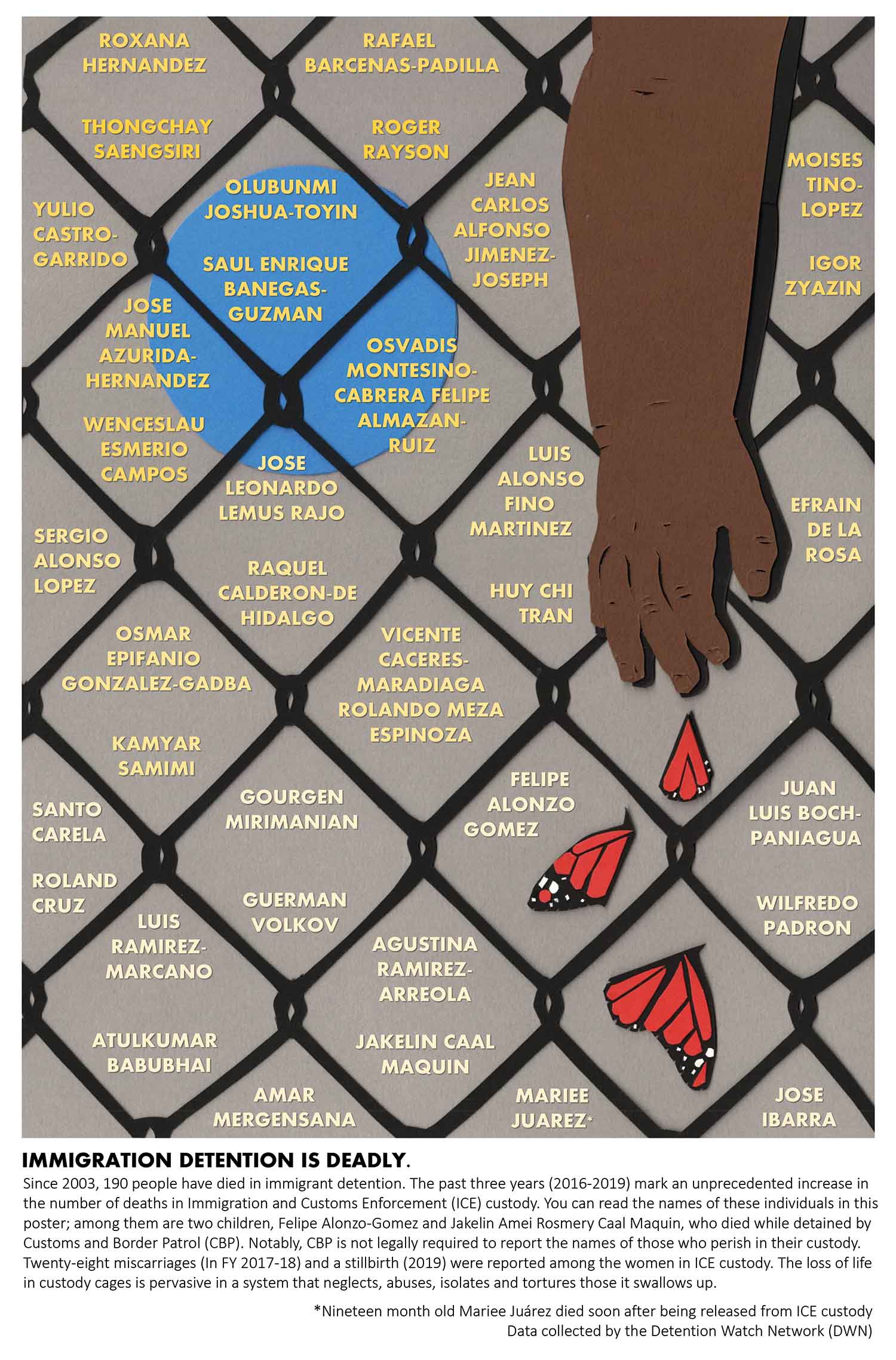09 Jul NYSCASA Monthly Digest – July 2019
Announcements from NYSCASA
Statement on US Immigrant Detention: Close the Camps, Bear Witness, Reunite Families, and End the Violence
As an organization committed to ending sexual violence while addressing oppression and injustice, NYSCASA condemns the violence and dehumanizing conditions faced by adults and children while detained in US Customs and Border Protection (CBP) migrant detention centers under the jurisdiction of the Department of Homeland Security. Read our full statement here.
Take action:
- Call your elected officials: Close the camps!
- Donate to #FreedomDay (July 4) Immigration Bond Funds
- Sign the petition telling the US House of Representatives to shut down this administration’s concentration camps
- More: How You Can Help Migrant Children Detained At The Border
- Support/get involved with these organizations:
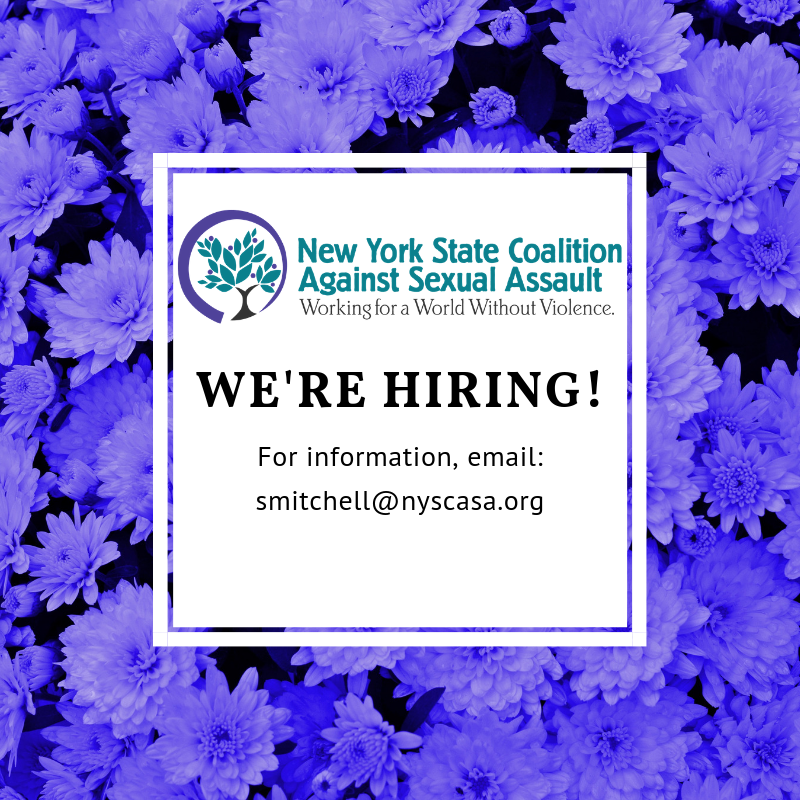 We’re Hiring!
We’re Hiring!
Save the Date: Healthy Relationships Project Trainings (August 12–13, September 23–24)
This summer and fall, NYSCASA will provide a two-day “train-the trainer” training on the Healthy Relationships Project, a child sexual abuse prevention curriculum. Locations are to be announced, but NYSCASA will offer the training on August 12–13 and again on September 23–24.
Stay tuned for updates and additional information from NYSCASA’s Prevention Director, Sarah Podber. If you have questions or concerns, please contact Sarah at spodber@nyscasa.org.
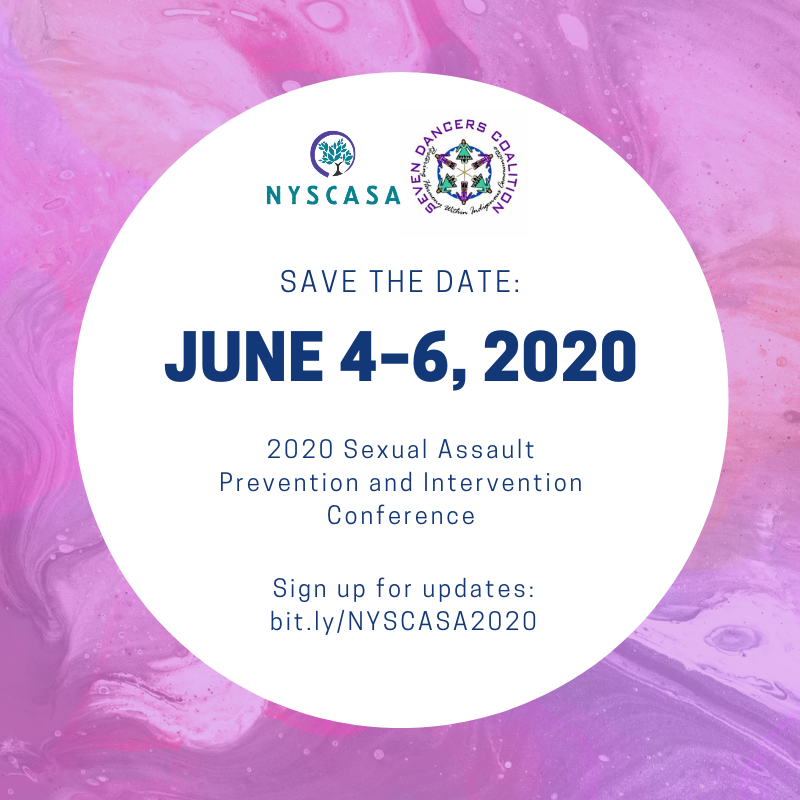 Save the Date: 2020 Sexual Assault Prevention and Intervention Conference
Save the Date: 2020 Sexual Assault Prevention and Intervention Conference
NYSCASA is thrilled to announce that we are co-creating a conference to be held in 2020 with Seven Dancers Coalition, the Indigenous anti-violence coalition in New York State and Haudenosaunee Country. The 2020 Sexual Assault Prevention and Intervention Conference will be held on June 4–6, 2020.
Location, speakers, and additional details to be announced. Pre-conference programming will be announced in the coming months.
The 2020 conference will build on the work initiated during NYSCASA’s 2017 conference, in which we created a place for attendees to think critically about approaches to ending sexual violence; to re-imagine current mainstream responses, programs, and policies from a transformative justice lens; and to explore grassroots community alternatives to sexual violence intervention and prevention.
Conference participants will:
- Learn about community-based alternatives to the criminal legal system to effectively support all survivors of sexual violence
- Acquire an in-depth understanding about restorative justice, transformative justice, and community accountability frameworks through concrete examples of community-based approaches to violence intervention
- Build skills in using community-based practices in the context of sexual violence prevention and intervention
- Develop the knowledge and skills to nourish and sustain communities that can prevent sexual violence, respond to harm, and heal trauma
Sign up to receive updates about the 2020 conference here: bit.ly/NYSCASA2020
For information about additional upcoming events, be sure to check NYSCASA’s calendar!
The Latest in Survivor-Centered Advocacy and Policy
Child Victims Act Resources
In February, Governor Andrew Cuomo signed the Child Victims Act into law. NYSCASA and the New York City Alliance Against Sexual Assault have come up with a resource guide to help survivors navigate their way through this challenging experience.
In addition, the Legal Project at Vera House Inc. has created a resource guide with information about the Child Victims Act and specific resources for survivors in Onondaga County.
To counteract the deluge of attorney ads and hard-selling tactics, Safe Horizon is also developing a guide for victims with questions to ask prospective attorneys. Safe Horizon, which runs a national victims’ assistance hotline, will also sponsor its own ad campaign this summer informing victims of the legislation and directing them to a credible resource site. NYSCASA will share these resources when they are available.
#SchoolGirlsDeserve Title IX Coordinators
Sexual harassment is one of several factors that can push young people to not finish their education. Our schools fail students when they fail to take action when bullying, harassment, and sexual assault occur.
Since 2018, Girls for Gender Equity (GGE) has called on the NYC Department of Education to hire additional Title IX coordinators to protect students from gender discrimination and gender-based violence. On June 14, GGE declared victory: New York City included $857,000 in their baseline funding to hire seven new Title IX coordinators to protect and support students.
Equal Rights Amendment: Passed, But Needs Reconciling
In June, the New York State Senate passed the Equal Rights Amendment (ERA), which will expand protections under New York State’s constitution for women, pregnant individuals, LGBTQ individuals, and New Yorkers living with disabilities (S517B). The Senate bill differs significantly from the version that passed in the Assembly in February (A271) which focuses solely on expanding protections in the NYS constitution for women, reports the Gotham Gazette; as a result, these differences will have to be reconciled for the amendment to advance.
- From WBFO: State Senate approves adding ERA protections to NY constitution
- From Gotham Gazette: Legislators Search for Common Ground on Expansion of Equal Rights Amendment
- From The New York Times: What Is the Equal Rights Amendment, and Why Are We Talking About It Now?
Workplace Sexual Harassment Legislation: Passed
After public pressure from the survivor-led Sexual Harassment Working Group, the New York State Legislature finally held the state’s first public hearings on sexual harassment in 27 years.
In June, New York State lawmakers passed sweeping anti-sexual harassment legislation (S6577/A8421) that removes the terms “severe or pervasive” from the legal standard, bans employers from using nondisclosure agreements to prevent employees from reporting discrimination, and extends the statute of limitations for complaints to three years.
- From HuffPost: New York State Lawmakers Vote to Reform Sexual Harassment Laws
- From The Intercept: The Sexual Harassment Bills Passed in New York Are the Structural #MeToo Victories We Need
- From The New York Times: Sex Harassment Laws Toughened in New York: ‘Finally, This Is Happening’
Legislation Extending Statute of Limitations for Second- and Third-Degree Rape: Passed
In June, New York State lawmakers passed legislation (S6574/A8412) to extend the statute of limitations for rape in the second and third degrees so that victims and survivors have more time to seek justice from the people who harmed them.
Currently, prosecution for rape in the second or third degree must start within five years of the offense, with limited exceptions. This legislation would extend this statute of limitation to 20 years for rape in the second degree and 10 years for rape in the third degree. Additionally, this bill would increase the time period for a victim to bring a civil suit for such conduct to 20 years. These provisions will allow victims time to recover from their trauma without losing the ability to pursue legal recourse.
- From Gotham Gazette: New York’s criminal law is about to undergo a major change following the legislature’s elimination of the statute of limitations for rape cases
- From New York Daily News: New York takes progressive steps to combat workplace harassment, bolster LGBT rights, and extend statute of limitations for rape
Legislation Banning ‘Gay Panic’ and ‘Transgender Panic’ Legal Defenses: Signed into Law
On June 30, Governor Andrew Cuomo signed into law legislation banning the gay and trans panic legal defense (S6573/A8375), fulfilling his promise to prohibit people accused of violent crimes from using homophobia and transphobia as a viable defense strategy in court.
- From the Office of the Governor: On WorldPride and 50th Anniversary of Stonewall, Governor Cuomo Signs Legislation Banning the Gay and Trans Panic Legal Defense
- From The New York Times: Cuomo signs a bill to end ‘gay panic’ defenses in murder cases
- From CBS News: New York bans “gay panic” defense in murder cases
- Learn more about ‘Gay Panic’ and ‘Transgender Panic’ legal defenses from the LGBT Bar Association
New and Noteworthy Resources
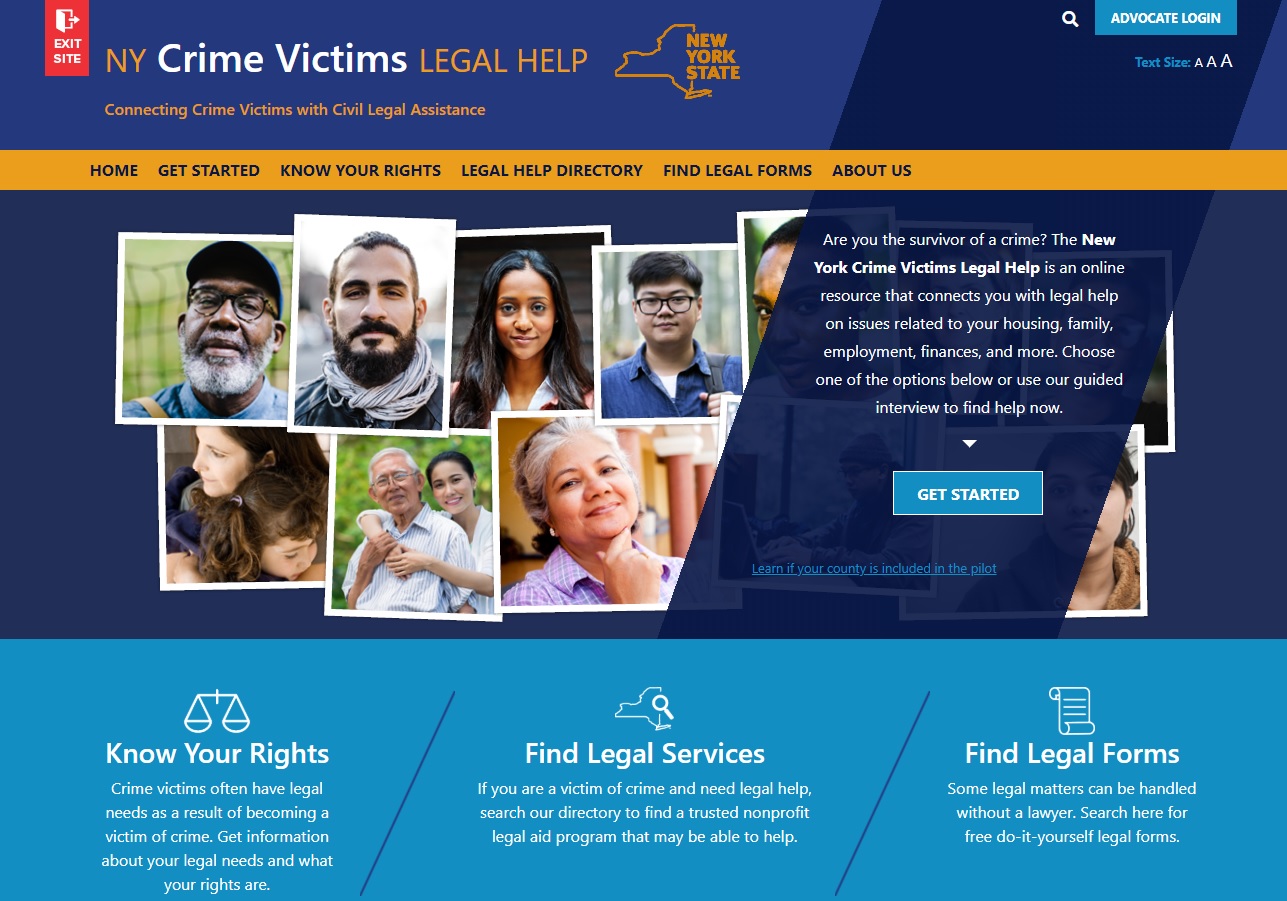 New Resource for Victims of Crime in NY
New Resource for Victims of Crime in NY
People often have a number of legal needs as a result of becoming a victim of crime. A new online resource, New York Crime Victims Legal Help, connects victims of crime to civil legal help on issues relating to housing, family, employment, immigration needs, safety, finances and more: https://crimevictimshelpny.org
New York Crime Victims Legal Help was piloted in Erie, Genesee and Niagara counties in the Spring and is now expanding to serve crime victims in the following regions: Capital Region (Albany, Columbia, Greene, Rensselaer, Saratoga, Schenectady, Warren and Washington counties); Mid-Hudson (Dutchess, Orange, Putnam, Rockland, Sullivan, Ulster and Westchester counties); Mohawk Valley (Fulton, Montgomery and Schoharie counties); and North Country (Clinton, Essex, Franklin, Hamilton and St. Lawrence counties).
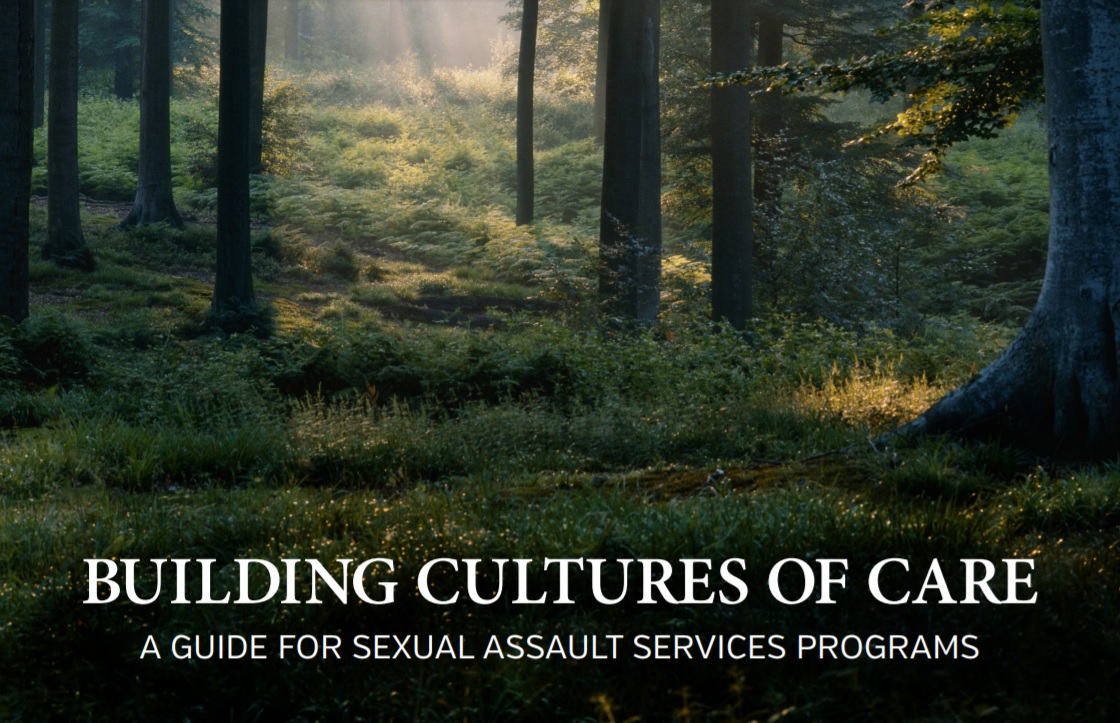 Noteworthy SADI Resource: Building Cultures of Care
Noteworthy SADI Resource: Building Cultures of Care
The Sexual Assault Demonstration Initiative (SADI) is the first large-scale project to address the challenges that dual/multi-service programs face in reaching sexual assault survivors. This month, we’re highlighting a publication called, Building Cultures of Care: A Guide for Sexual Assault Services Programs.
This guide provides information to support sexual assault services programs in strengthening their organizational and individual responses to survivors of sexual violence through the use of a trauma-informed approach. It provides an overview of the core principles of trauma-informed care and guiding points and questions to help organizations build cultures grounded in the philosophy of trauma-informed service delivery.
- Building Cultures of Care: A Guide for Sexual Assault Services Programs
- La Cultura De La Atención Integral Una Guía Para Programas Con Servicios Ante La Agresión Sexual
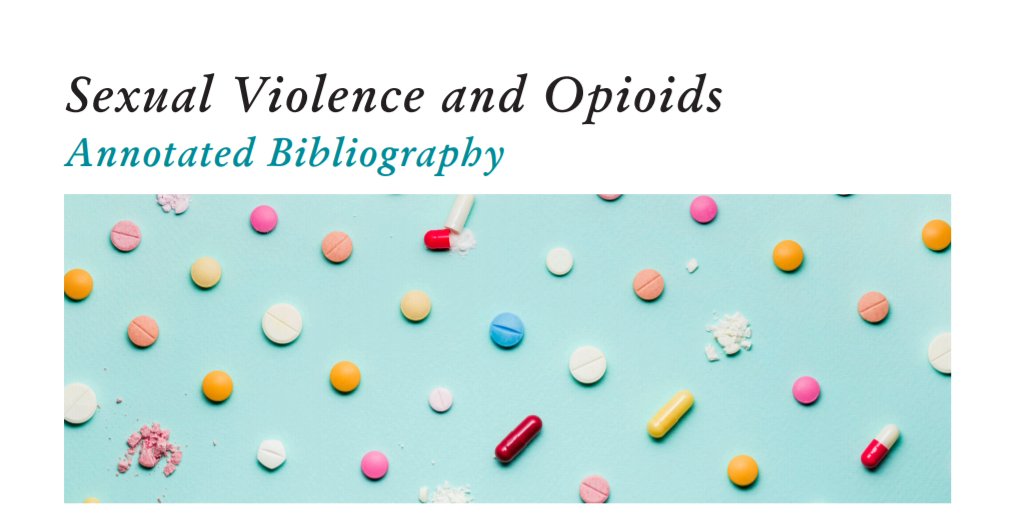 New NSVRC Publication: Sexual Violence and Opioids – Annotated Bibliography
New NSVRC Publication: Sexual Violence and Opioids – Annotated Bibliography
This new resource, an annotated bibliography created by the National Sexual Violence Resource Center (NSVRC), explores research from 2009 to 2019 on the relationship between opioid use and sexual victimization. Current research suggests that people who struggle with opioid use report high rates of adverse childhood experiences, sexual assault in adulthood, and mental health problems such as post-traumatic stress disorder, suicidal thoughts, and psychological distress. These research findings illustrate the importance of service providers screening opioid users for prior sexual victimization and implementing trauma-informed treatment regimens.
Noteworthy NCDBW Resource: Ending Mass Incarceration Webinar Archive
In 2017 and early 2018, the National Clearinghouse for the Defense of Battered Women (NCDBW) hosted a series of webinars as part of their project entitled, Ending Mass Incarceration, Centralizing Racial Justice, and Developing Alternatives: The Role of Anti-Domestic Violence and Sexual Assault Programs. Here’s a small sample:
- Centering Our Work on Historically Marginalized Communities: The Idaho Coalition Against Sexual & Domestic Violence has been on a transformational journey—from an inward-facing individual and organizational transformation to an outward-facing journey. Idaho Coalition staff members Kelly Miller and Jennifer Martinez describe what inspired the transformation and what the internal individual and organizational changes look like.
- Why Opposing Hyper-Incarceration Should Be Central to the Work of the Anti-Domestic Violence Movement: In this webinar, Professor Donna Coker discusses the enormous growth of the US prison population and the larger phenomenon of what Beth Richie describes as “Prison Nation.” She describes the impact that mass incarceration and the growth of criminalization has on work to prevent and respond to domestic violence and sexual assault.
- Dancing the Carceral Creep: The Feminist Anti-Violence Movement and the Pursuit of Criminalization, 1973-1986: Long-time activist and scholar Mimi Kim provides a historical examination of the anti-domestic violence movement and its eventual reliance on carceral or pro-criminalization practices and policies. By focusing on this historical tale, Mimi discusses how actions that can seem strategic and even radical can turn into something quite different than originally envisioned. Mimi also talks about how the lessons of history can give us guidance as to how we can move forward in our work to end violence.
Job Opportunities
- Associate Director of LGBTQ Equity (Civil Service Open Competitive) – NYC Department of Education (Brooklyn, NY)
- Client Advocate – YWCA Northeastern NY (Schenectady, NY)
- Crime Victims Attorney (2) – Empire Justice Center (Rochester, NY)
- Director of Development – Victims Information Bureau of Suffolk (VIBS; Islandia, NY)
- Domestic Violence Counselor Advocate – Advocacy Center of Tompkins County (Ithaca, NY)
- Housing Case Manager – Advocacy Center of Tompkins County (Ithaca, NY)
- Legal Director – The Legal Project (Albany, NY)
- Program Associate – Joyful Heart Foundation (New York, NY)
- Multiple positions – Center for Safety and Change (New City, NY)
- Multiple positions – Family Services, Inc. (Poughkeepsie and Kingston, NY)
- Multiple positions – Sanctuary for Families (New York, NY)
- Multiple positions – The Safe Center LI (Bethpage, NY)
- Multiple positions – VIP Mujeres (New York, NY)
- Multiple positions – Wellspring (Saratoga Springs, NY)


